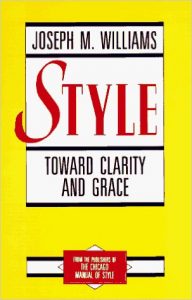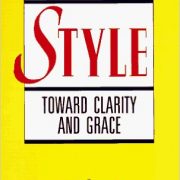Rules for writing clearly
Clarity matters. Yet it’s often lacking in documents about investments, wealth management, and financial planning. Joseph M. Williams’ chapter on clarity in Style: Toward Clarity and Grace intrigued me because it takes a different approach to writing clearly. It focuses on the characters in your writing. The concept of a “characters” is a bit murky, but it appears to refer to the main actors or topics in a sentence.
Key recommendations for writing clearly
 Here are his Williams’ recommendations for clear writing:
Here are his Williams’ recommendations for clear writing:
Readers are likely to feel that they are reading prose that is clear and direct when
(1) the subjects of the sentences name the cast of characters, and
(2) the verbs that go with those subjects name the crucial actions those characters are part of.
Here is my attempt to write a bad sentence to illustrate his points:
It should be understood that one’s lack of understanding of what is needed to improve asset allocation may be a contributing factor in the development of asset allocations that experience failure in helping people in the achievement of their goals.
To Williams’ points, who are the “characters” in my sample sentence? “One” is vague. So is “people.” It looks to me as if they refer to “investment managers” and “clients.” Using these words will satisfy the author’s suggestion that you use specific instead of abstract nouns.
Also, there don’t appear to be any verbs that go with “one” or “people.”
Here’s my rewrite:
When investment managers don’t understand asset allocation, they create portfolios that fail to achieve client goals.
Do you see how my rewrite follows Williams’ suggestions and is easier to read than my original sentence?
Related rules
I found more rules for writing clearly in Williams’ chapter on clarity.
- Avoid abstract nouns when possible.
- When rewriting, name the missing characters to improve clarity.
- Don’t turn verbs into nouns.
- “If you find that (1) you have to go more than six or seven words into a sentence to get past the subject to the verb and (2) the subject of the sentence is not one of your characters, take a hard look at that sentence; its characters and actions probably do not align with the subjects and verbs…. Revise the sentence so that characters appear as subjects and their actions as verbs.”
- “…there is nothing wrong with a long sentence if its subjects and verbs match its characters and actions.”
- “In some cases, nominalizations are useful, even necessary. Don’t revise these.” As the saying goes, “There are exceptions to every rule.”
- “…whenever you find in your writing a string of nouns that you have never read before and that you probably will not use again, try disassembling them.”
Williams explains many examples in his book. Check it out if you enjoy learning by analyzing sentences.
Style: Toward Clarity and Grace isn’t an easy read.In fact, I wrote this post partly to help myself figure out the main lessons of his “Clarity” chapter. However, it’s a thoughtful book that may help you improve your writing.
Disclosure: If you click on the Amazon link in this post and then buy something, I will receive a small commission. I only link to books in which I find some value for my blog’s readers.





Great post Susan! Thank you very much for sharing this detailed information..It was very useful for me..